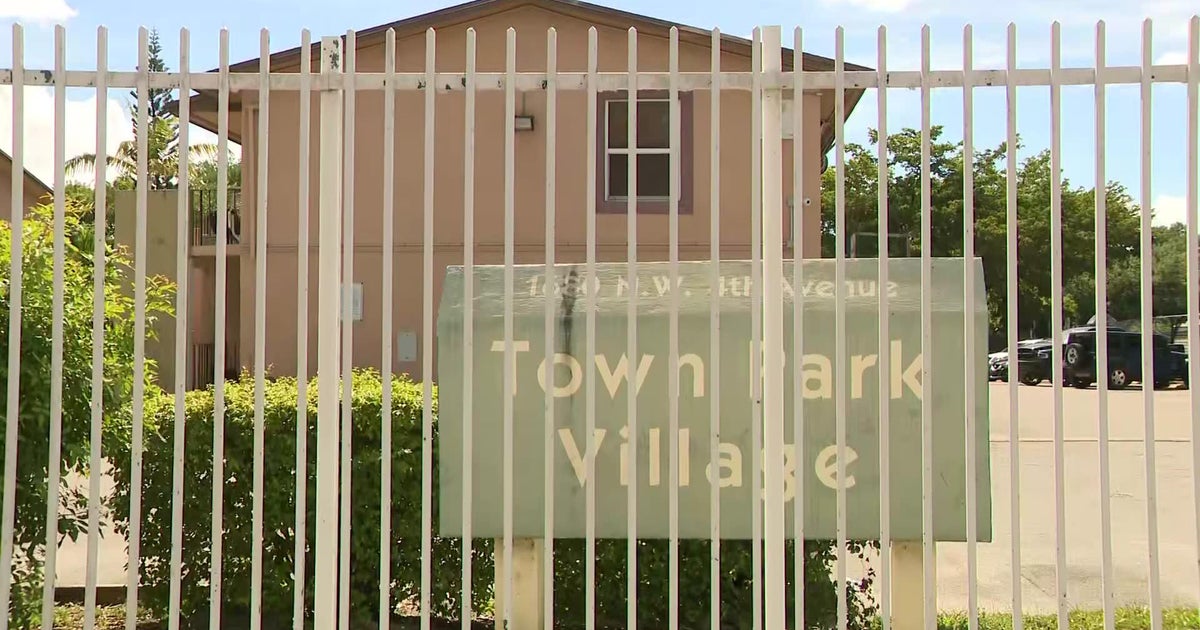Shareholders spared eviction from an Overtown co-operative could still lose their homes and every dollar invested.
At least 14 have ejectment hearings pending in Miami-Dade Circuit Court.
All live in Town Park Village. Residents there claim the board of directors manipulated records to strip away rights.
Latasha Robinson, a resident for 37 years, inherited her unit in Town Park Village from her mom, who owned and shared it with Robinson in 1989.
Last year, Robinson discovered her name was no longer on her unit’s deed. Miami-Dade Property Appraiser records show the unit belongs to Town Park Village.
Robinson said the board required her to sign a tenant agreement.
“I didn’t sign it because it was stating that if you sign this new occupancy agreement, they were taking some of your shares from you,” she said. “I didn’t agree with that. So I did not sign.”
She said the board also started charging high fees.
“I never had a meeting or agreed on none of this,” Robinson said.
Like several other residents, Robinson then faced eviction. Her lawyer, Jesse Phillippe, successfully convinced a judge that Robinson and at least 13 others could not be evicted because each owns shares.
However, all remain at risk of losing their homes.
“They are extremely vulnerable,” Philippe told CBS News Miami last month. “I think that way the way [Florida] statute is construed, it leaves a lot of emptiness, a lot of holes that can be exploited.”
CBS News Miami Investigates showed Robinson’s case to Ari Pregen, an attorney who practices real estate law and is familiar with co-op cases.
“People think that they’re buying a unit [in a co-op],” Pregen said. “They’re not really buying a unit. What they’re doing is they’re buying stock. They’re getting ownership in the corporation itself. They get the right to occupy a particular unit, like an investment you can live in.”
Pregen said state law does not allow shareholders to be evicted. They can be ejected, though.
At least 14 Town Park Village shareholders face ejectment, a legal term for being forced to leave and stripped of ownership shares, in the cases before circuit court judges.
All involved shareholders are facing expensive fees charged on top of normal payments to the board, which claims it approved the increases by a legally binding vote.
When the shareholders did not pay the extra money, the board seized shares and ordered residents out.
Several claim the board did not legally vote.
“We never voted about anything,” said shareholder Pamela Smith.
“No, I’ve never had any contact with them,” added Lillian Slater, another shareholder who used to be a board member.
“There are a lot of elderly that’s struggling with the [fee] increase that was unauthorized,” said Twarla Hill, another shareholder.
Pregen said the legality of the vote will likely decide shareholders’ fate.
“There has to be a vote,” he said. “The vote has to be done a particular way. It has to be done the right way with proper notice to all the shareholders. If the answer to that question is no, it was not properly done right, then I think everything [filed by TPV’s board] gets undone.”
CBS News Miami Investigates called and emailed the lawyer for Town Park Village. He did not respond.
TPV’s court filing, though, includes the co-operative’s bylaws. They call for 20% of members to be present in person or by proxy for votes.
The bylaws also say all affairs “shall be governed by not less than five nor more than nine” directors on the TPV board.
TPV records obtained by CBS News Investigates show four members of the board voted without opposition to evict Hill, Smith, Robinson and Slater.
“It feels bad,” Slater said. “Where can I go, me and my husband? We’re too old. What can we do?”
“The whole objective of Town Park was to buy low-income housing and it did that for years,” Philippe said. “Now, there’s low-income housing that has elderly people relying on social security and that is where (fee increases are) becoming an issue. You’re asking people making $800 to pay $3,000.”
If they lose in court, Robinson and others stand to lose nearly everything. An ejection forces shareholders out, takes their investments in the property, their shares and gives them no money.
“I invested a lot here,” Robinson said. “I’ve been here for going on 38 years. I feel betrayed. How could (the board) just come and try to take my property from me?”



